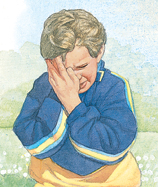Corneal Injury
Your cornea is the clear layer on the front of your eyeball. It protects your eyeball from dust and germs and helps filter out harmful ultraviolet (UV) rays. The cornea also helps to focus light entering your eye. Although your cornea is composed of strong proteins, it can be injured. A slight cut or scratch (abrasion) is often minor. But a bad abrasion or a puncture to the cornea can be very serious. These are medical emergencies.

A blow to the eye can cause damage to the cornea (front layer of the eye).
Something in Your Eye
If you think you have something small in your eye, flush it with water right away. Pull your upper lid out and over your bottom lid to help increase the flow of tears across your eye. If these methods don't work, call your doctor. Never try to remove an object from the eye that doesn't flush out easily with water. Doing so may cause more damage.
When to Go to the Emergency Room (ER)
Call 911 or your local emergency number if you have:
-
Severe eye pain.
-
A puncture injury or bad abrasion.
-
A particle in the eye that you can't flush out with water.
-
A very swollen or painful eye after removing an object.
-
A chemical burn.
-
An object embedded in your eye. (Cover both eyes with a sterile compress and keep both eyes closed while you wait for help. DO NOT put any pressure on the eyes.)
What to Expect in the ER
For minor abrasions: Minor abrasions are usually treated with eyedrops or ointment. You may be given antibiotics to prevent infection. In some cases, you may wear a patch on your eye overnight. Most abrasions heal in a day or two. To help rule out more serious injuries, you may have one or more of these tests:
-
A standard eye exam checks how well you can see.
-
A slit-beam exam uses a beam of light and a microscope to show your eye in detail.
-
A Seidel test uses a special dye to look for severe eye damage.
Depending on the results of these tests, you may be referred to an eye specialist (ophthalmologist).
For serious abrasions or punctures: You will be referred directly to an ophthalmologist for emergency treatment. An eye specialist is needed to minimize further damage and possible vision loss.
 Please visit us at our new location:
Please visit us at our new location: